Learning German? Find out how you can easily avoid the most common German mistakes with these super simple fixes in under 10 minutes!
Kerstin, a native German, an educator, and the brains behind the language blog Fluent Languages, is here to shed some light on the most common German grammar mistakes students make and how easy it is to avoid them. Ready? Here’s Kerstin!
When you’re learning a foreign language, there are two kinds of mistakes you will make. The first is the big guns: those garbled sentences that you can avoid only by learning whole new structures and making sure you remember the right words and grammar. The second is the near misses: those that you can quickly fix and avoid in the future because what you are saying is so almost correct.
When you first start out speaking a foreign language, you’ll have quite a few near misses. Sometimes you’ll translate things literally, or simply forget to apply a grammar rule. This happens with the German language and all many other languages. I’ve been a German teacher for many years and created this German course with Olly Richards so I have seen my fair share of near misses and I’m happy to share my top tips to avoid them. For more tips, check out my course on how to improve your German accent and pronunciation and my German Grammar course here.
We’re going to cover common vocabulary, grammar, and pronunciation mistakes. Plus, there is a special secret bonus tip right at the end.
Here are 13 common German mistakes that you can fix in under 10 minutes!
Common Vocabulary Mistakes in German
Forgetting vocabulary is normal and no big deal. But a near miss…that’s frustrating because you often don’t even see the mistakes coming. With the following tips, you’ll learn how to avoid the most common pitfalls in German.
1. Use das da or das hier
German grammar endings can be difficult to use. Imagine you’re enjoying a wonderful afternoon Kaffee und Kuchen (coffee and cake) session with your friend and you want to compliment her awesome Streuselkuchen (heavenly crumble cake).
You want to say ‘this is delicious!’, but how the heck do you say “this” again? It is, diese? dieses? dies? or dieser? What is even the gender of a streuselkuchen?
Spare yourself all the stress and sound super German by simply using the two expressions das da and das hier, which means “this thing here” and “that thing over there” respectively. They’re pretty independent of gender and will work for any singular word.
Boom! on to the next typical German mistake.
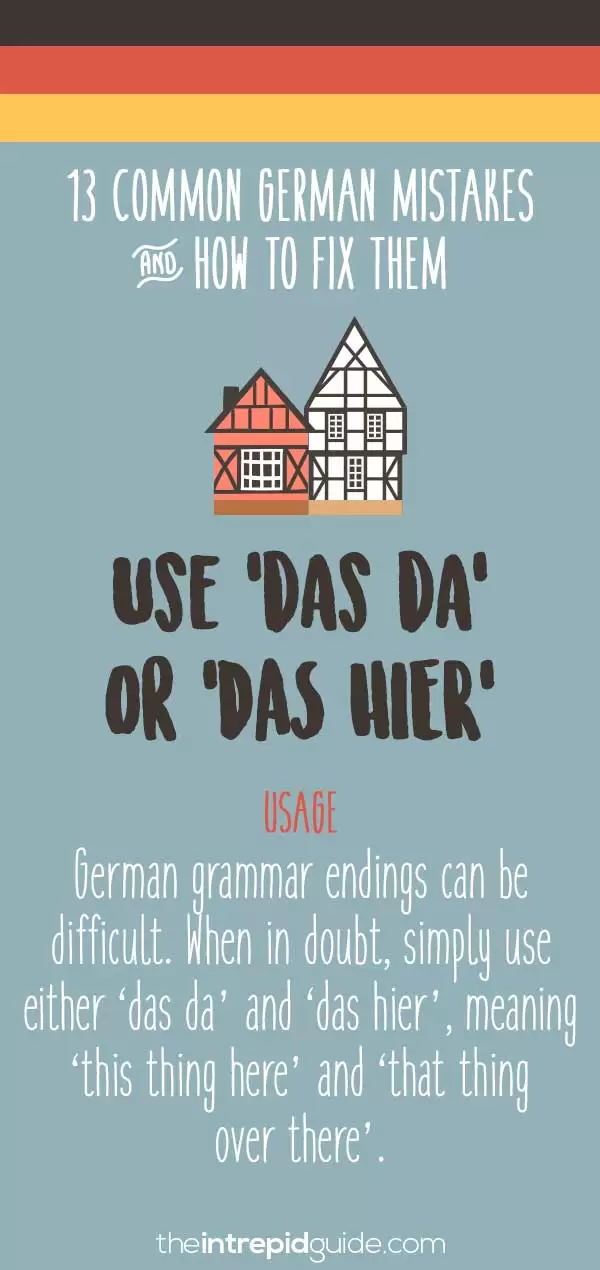
2. Don’t use “in” when saying a date in German
There are two ways of saying that something happened in a certain year, and neither of them contains the word ‘in’. You can either use the expression im Jahr (in the year of), or you can say the year, i.e. just the number.
Here’s how it looks:
English: I was born in 1985
German: Ich bin 1985 geboren
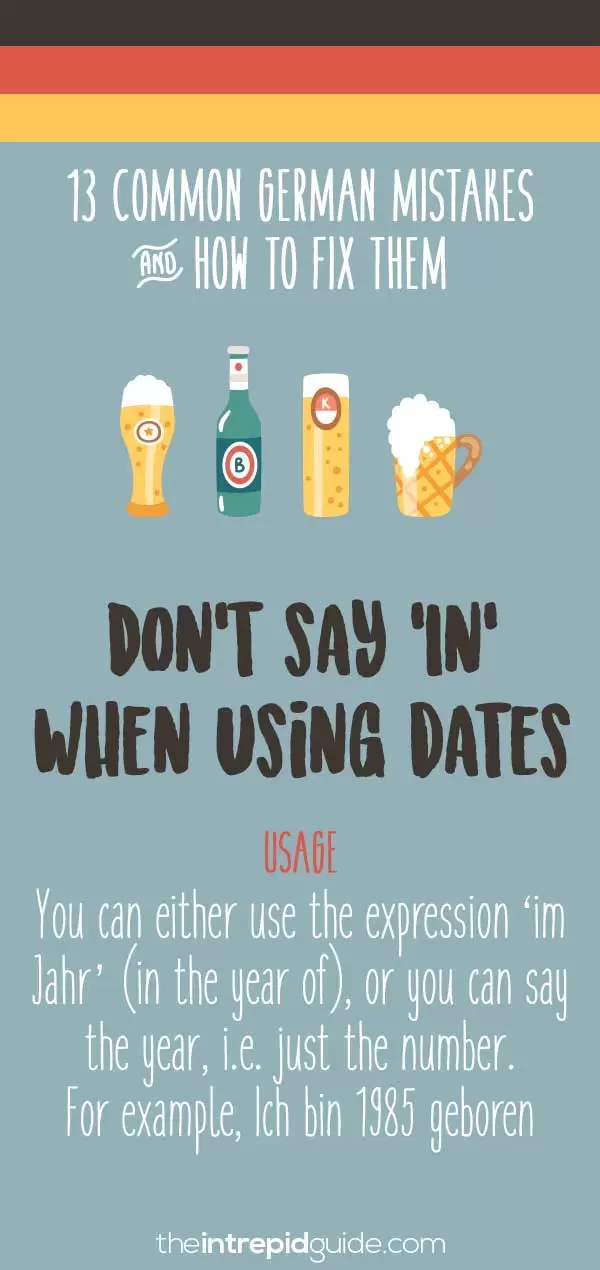
3. When talking about languages, use ‘kann’
Instead of saying that you can “speak” any language, you can tell a German simply that you ‘can’ language! For example, if you speak German, French, Turkish, Spanish and Italian, this is how you’d tell your German friends: Ich kann Deutsch, Französisch, Türkisch, Spanisch und Italienisch (I can speak German, French, Turkish, Spanish and Italian). This is the one time you’re allowed to forget the actual verb at the end!
This is just another way to be more efficient with your German language skills.

4. Don’t Say Ich bin heiß or Ich bin kalt
In Germany, the temperatures can get high in the summer and low in the winter, so it’s handy to know how to express your feelings about the temperature.
While heiß (hot), warm (warm) and kalt (cold) are the correct words to use for “hot” and “cold”, using them with ich bin will mean you’re telling people that you’re a hot or cold person. When you’re talking about how you’re feeling in the moment, simply replace the words ich bin with mir ist:
Mir ist heiß = I am feeling hot
Mir ist warm = I am feeling warm
Mir ist kalt = I am feeling cold
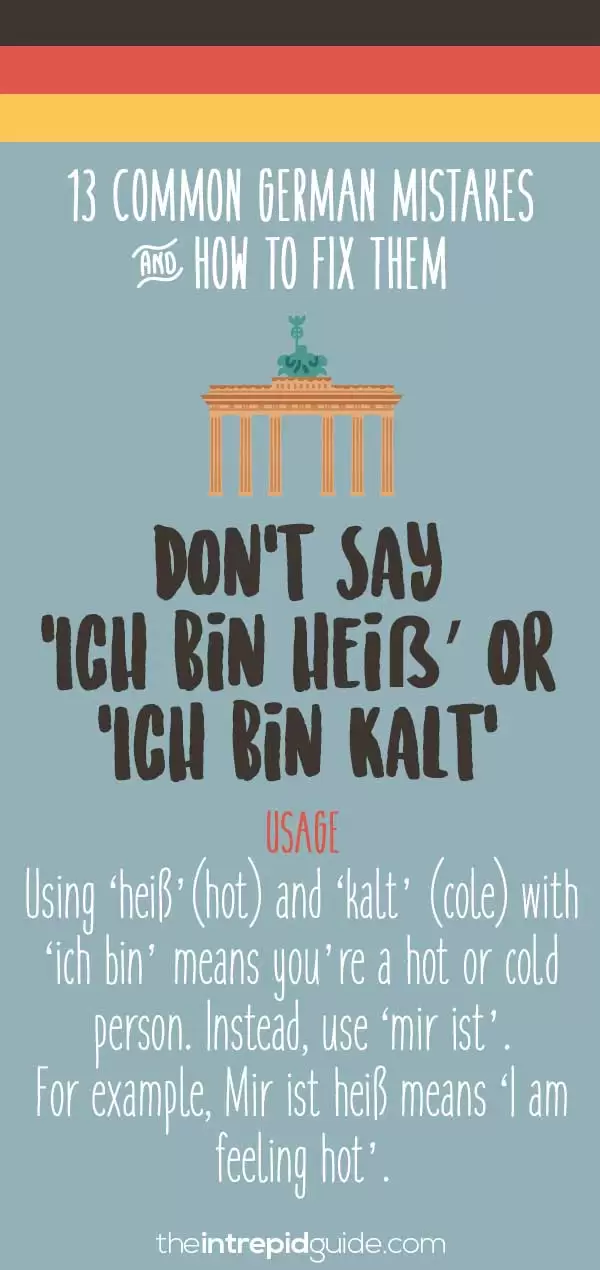
5. Watch out for the time
Germans say the time in two different ways. In schedules and formal environments, you will often hear the 24-hour clock times said out loud, as in Der Zug geht um 19 Uhr 45. (The train is leaving at nineteen hundred hours and forty-five). Once you get used to this, it’s a great way to avoid misunderstandings.
The other way of telling the time involves the words viertel (quarter) and halb (half) just like in English, but beware, when Germans say a time as halb, they actually mean one hour earlier than English speakers. This is because Germans think of half TO the hour, or the hour being half full.
So, remember: Half fünf is actually half past four.

6. Know Your Freund-ship
In English, you can simply call a friend a friend. But in German, watch out because the words freund and freundin can mean either a platonic friendship or a romantic relationship.
It’s common to use mein/meine (my) with the word freund/freundin. Be aware that this is ambiguous. It can mean a friend but often Germans will assume you are talking about a boyfriend or girlfriend. If you’re trying to impress a potential date when you drop a cool line about mein Freund (my boyfriend), things may not work out the way you liked.
So, how do you clear up your relationship status? Here are few tips:
- When you want to say “my friend” as in “my buddy”, use the expressions ein Freund von mir (a friend of mine – male) and eine Freundin von mir (a friend of mine – female).
- If it’s one of your besties, you can also say mein bester Freund (my best friend – male) or meine beste Freundin (my best friend – female).
- The third way to make it clear that a friendship is platonic is to name that friend when you’re talking about them, for example, meine Freundin Daniela.
Here are some examples to help you clear it up:
- Am Samstag gehe ich mit meiner Freundin ins Kino – On Saturday, I’m going to the cinema with my girlfriend. = LOVE RELATIONSHIP
- Mein Freund Oliver und ich trinken heute Abend ein Bier zusammen – My friend Oliver and I are having a beer together tonight. = PLATONIC
- Meine Freundin kommt auch zum Essen – My girlfriend is coming for the meal, too. = LOVE RELATIONSHIP…but we can’t be 100% sure.
- Ich liebe meine Freundin. I love my girlfriend. = LOVE RELATIONSHIP…and we’re pretty sure ?
Of course, Germany is a traditional country and many people assume your relationship preference is heterosexual. A female referring to her girlfriend as meine Freundin or a male referring to his boyfriend as mein Freund may find they need to make it clear that this IS a love relationship. As Pat Benatar said…love is a battlefield.

Common Grammar Mistakes in German
Grammar mistakes, these are the big guns! None of the following tips required you to memorise big tables. Instead, you can take action right away and cut out certain things that make you sound less of an expert. If you want to get more grammar explanations and fix your most common errors, check out my course German Grammar for Beginners.
7. Don’t overuse the future tense
The German language does have a future tense which is not very difficult to use. However, in practice, most German speakers don’t actually use a future tense at all. When speaking the German language, I often hear learners tell me things like Ich werde am Wochenende nach Koblenz fahren (I will go to Koblenz at the weekend). It not incorrect German, but it feels complicated and doesn’t sound right..
The signal am Wochenende (at the weekend) tells your conversation partner that you’re referring to the future, so most native speakers will simply say Ich fahre am Wochenende nach Koblenz to express the same thing.
Language evolves to make communication as efficient as possible, so on this occasion, you can stick with using the present tense even when you’re talking about the future.

8. Put the verb in second position
The English language has a nice and firm sentence structure: Subject-verb-object. In German, the first sentences you learn are simple. They follow that same structure, so you may assume that the rule is the same.
But in fact, our word order is all about one big star diva called the verb. Your sentence doesn’t revolve around the order of those three parts together, but much more around where the verb stands.
And where is that verb? In simple statement sentences in the German language, the verb will stand in position two. That means once you add in anything else BEFORE the sentence kicks off, you need to put the verb before the subject.
Let’s have an example to bring light into this system:
Standard sentence structure in English and German:
My sister drives an Audi.
SUBJECT VERB OBJECT
Meine Schwester fährt einen Audi.
SUBJECT VERB OBJECT
Let’s add something else in position 1, such as a time signal:
Today my sister drives an Audi.
TIME SIGNAL SUBJECT VERB OBJECT
Heute fährt meine Schwester einen Audi.
TIME SIGNAL VERB SUBJECT OBJECT
In the German sentence, the verb stayed firmly in the second position. In the English sentence, the verb stayed behind the subject.
When learning German, it helps to focus on how the word order centres around the verb and not the order of the different parts. Once you figure that out and focus on putting the verb in the second position, your simple sentences will always sound right.
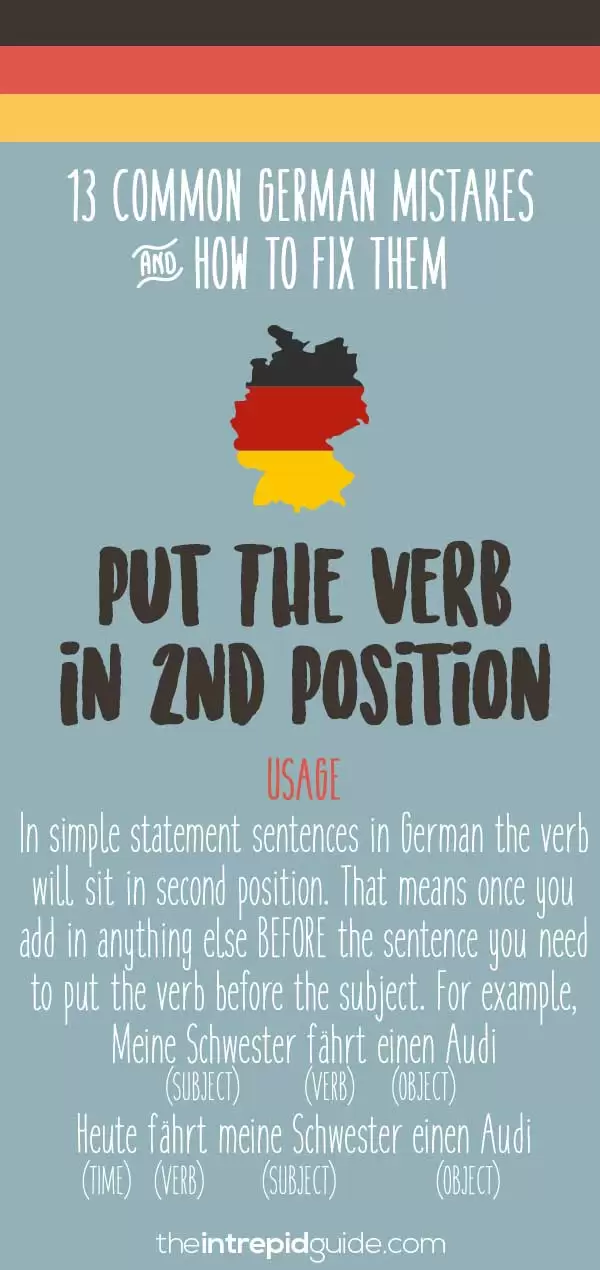
9. Don’t forget your separables
In German, many of the verbs take a range of prefixes. Some examples of these are auf-, ab-, um-, zu- or hin-. Every time a prefix is added to a verb, the meaning of the verb is altered.
For example, the word sehen means “to see” but the word aussehen means “to look”, referring to its appearance. They’re completely different words and show up separately in the dictionary.
The trick is to know that the prefix aus- separates from the stem sehen when you insert the verb in a sentence and it will sit at the end of the sentence.
Many learners know this in theory, but they often forget all about the prefix when they put this knowledge into practice. So this leads to sentences like Wow, diese Pizza sieht lecker! meaning “wow, this pizza sees deliciously!”. What the speaker meant to use was the word aussehen, but forgot the second half of the separable word and caused a misunderstanding. Said correctly, it should be, Wow, die Pizza sieht lecker aus. Guten Appetit!
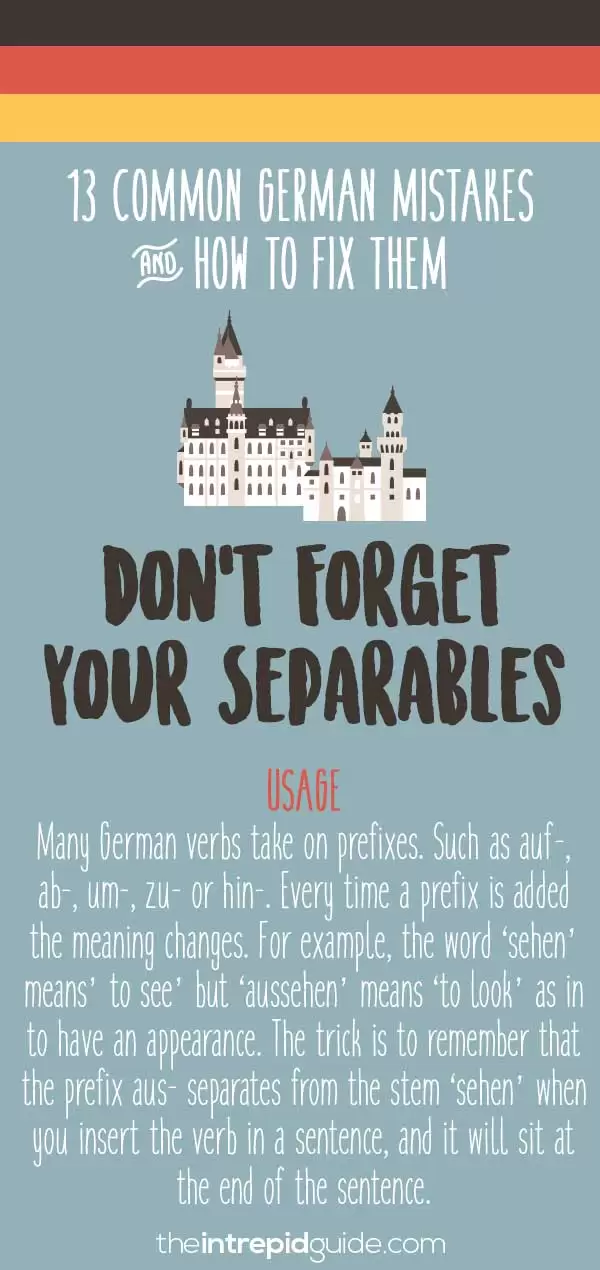
10. Use Sie with strangers*
In Germany, we take our formality seriously. The English word “you” can be translated in several ways so it’s important to choose the correct one.
- Use du when you are talking to friends, children, or animals.
- Use Sie when you are talking to adult strangers, anyone in a formal or shop environment, and on the phone.
- Use ihr when you are talking to a group of friends.
If you are worried about sounding too formal with Sie, don’t worry. Most Germans will happily guide you along in the conversation,and they may “offer the du” by saying wir können du sagen or du kannst du zu mir sagen? (we can use du, you can call me du?).
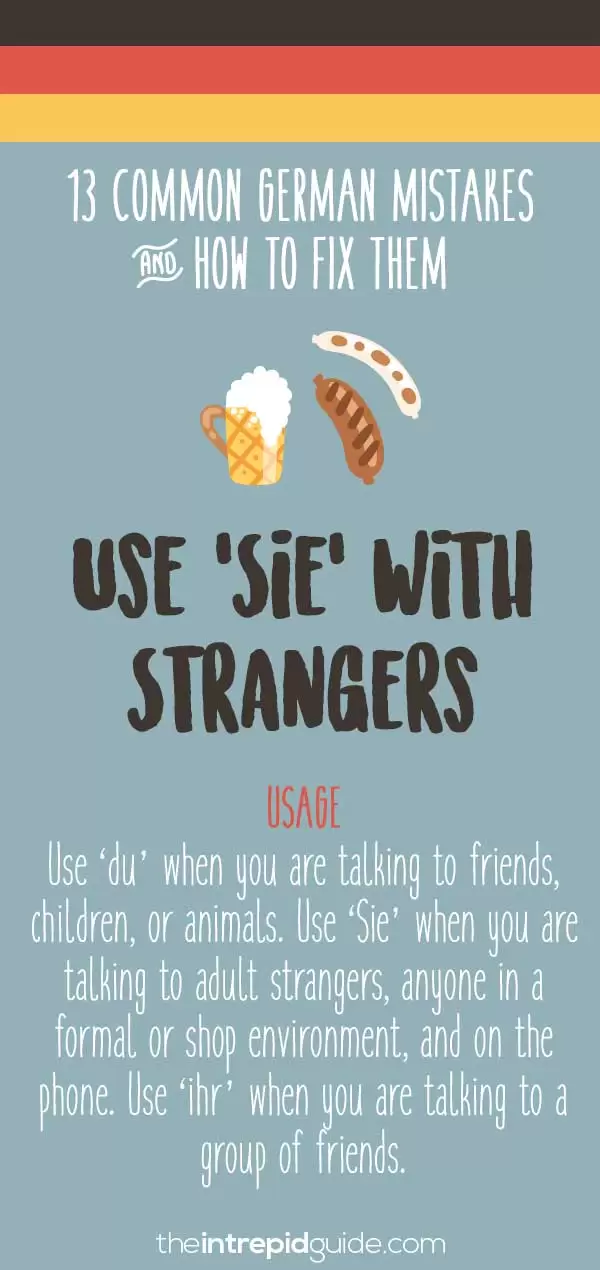
11. Choose the right past tense verb
In German, the most common way of speaking about the past is to use the Perfekt, a tense that is very similar to the past perfect in English. For example, you say Ich habe gegessen for “I have eaten”. The trick with the German past tense is to know when to use the verb sein and when to use the verb haben (to have).
In English, you almost always say “I have” in these tenses: I have eaten, I have jumped, I have studied. But in German, we sometimes use the verb sein (to be) and you’ll need to learn when to use each one. Luckily, there’s a pretty straightforward rule. In the German Perfekt, you use a form of sein for verbs of motion or transition.
For example:
- gehen (to walk, to go)
- laufen (to run)
- springen (to jump)
- fahren (to drive, to go)
- sinken (to sink)
- werden (to become)
- sterben (to die – yep, death is a transition)

Common Pronunciation Mistakes in German
German is a phonetic language, so once you learn how to pronounce something you will usually do it correctly. But sometimes German language students assume that this means German pronunciation doesn’t have to be studied. This is not the case as you’ll see with these next tips.
If you want to get ahead in German pronunciation and understand the locals much better, check out my course on German pronunciation.
12. Pronounce the vowel length correctly
In German pronunciation, each vowel can either be pronounced as a short or a long variant and if you pronounce it incorrectly you can change the whole meaning of the word you are saying.
For example, when you pronounce the vowel in Brot as a short o instead of stretching it, the sound will stand out as very foreign to any native speaker. Go with the rule of thumb: If the vowel sits before two consonants, it is pronounced short.
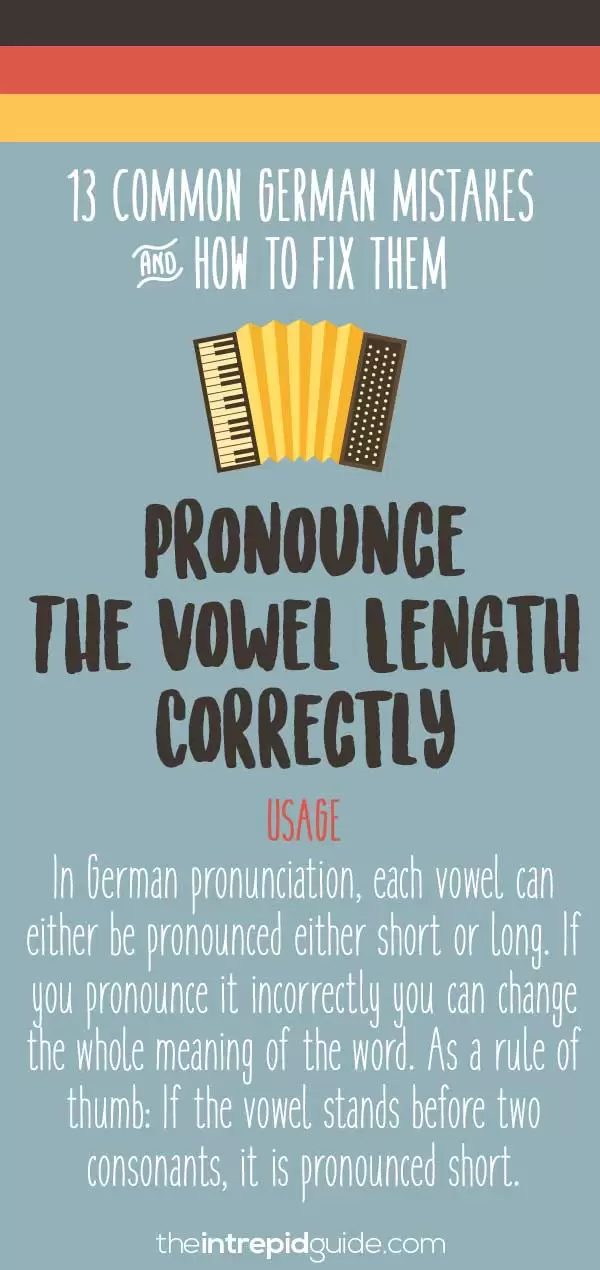
13. Watch out for ei and ie
At the last World Cup one of my German students sent me an excited voice message which sounded like Wow, dee Englander werden Elfmeter shy-sen. I replied, “I most certainly hope not! ?”.
So, what went wrong? When native English speakers see the letters “ie”, they want to pronounce them to rhyme with “shy”. However, in German, this letter combination actually rhymes with “she” or “see” and if you pronounce it incorrectly the meaning of the word can change quite a lot – even from ? (schießen, to shoot) to ?(um…ask your German friend).
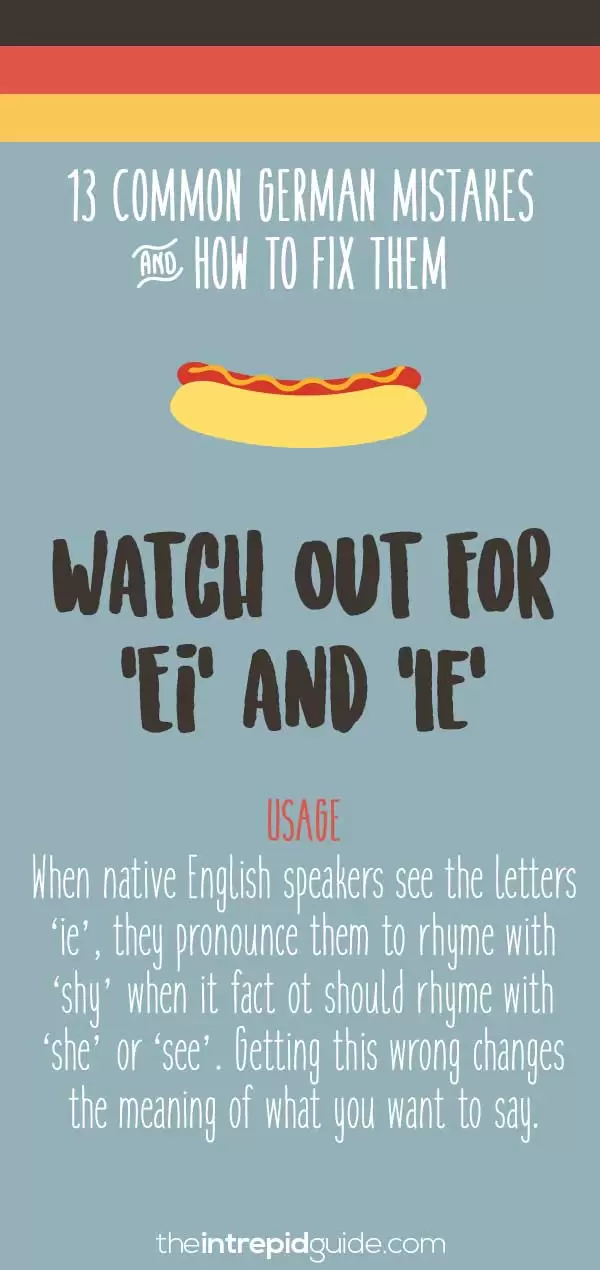
Culture Mistakes in German
BONUS TIP: Don’t assume Germans are all Bavarians
Germany is a diverse country where every region has its own distinct identity and personality. And that means we don’t all wear Lederhosen. Heck, we don’t even all live near a brewery or winery even though Germany boasts some of the world’s best wine regions.
The best way to work out if your German stereotype is true is to simply come and visit Germany. We are friendly and welcoming, and every part of Germany has a wealth of beautiful nature and history to offer. And we’ll see you in the Biergarten!
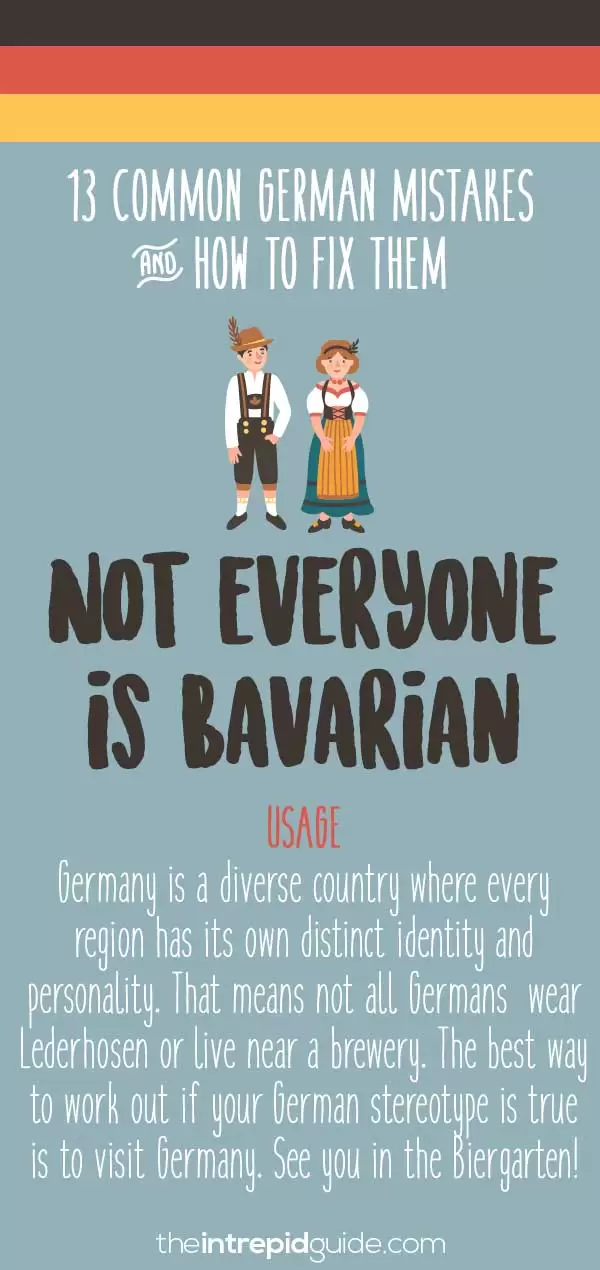
How many of these mistakes have you made?
Don’t worry if you have every single one. The best thing about making a mistake is that you get to fix it afterwards and now you can with these helpful tips. Need support? Check out my German courses including how to improve your German accent and pronunciation and my German grammar course. See all my courses here.
Got a tip? Leave a comment below and share your own stories and tips for other German learners.
Kerstin is the writer and educator behind fluentlanguage.co.uk, a website helping everyone build a language learning habit. Kerstin is a native German speaker and comes from the beautiful Moselle valley. She studied six languages in Germany and then packed them up and moved to England, where she added her most recent language crush, Welsh. She is a language learning coach, host of the Fluent Show Podcast, and runs language learning retreats in Germany.
Like it? Pin it for later!

Learning German? Then you’ll love these…
- 50 Amusing German Phrases that will Brighten Your Day
- Is German Hard To Learn? PLUS 7 Common German Mistakes to Avoid
- 27 Hilarious Everyday German Idioms and Expressions
- Help a friend kick start their German with this free German Travel Phrase Guide
- Essential Swiss-German Travel Phrase Guide
- When you first start out speaking a foreign language, you’ll have quite a few near misses. Sometimes you’ll translate things literally, or simply forget to apply a grammar rule. This happens with the German language and all many other languages. To learn through the power of story, check out this excellent German course with Olly Richards. For more tips, check this course on how to improve your German accent and pronunciation or this German Grammar course here.
Want to know more about learning languages? Start here!
- 14 Top Language Learning Resources You Should Use
- 23 Cool Gift for Language Learners They Will Actually Use and Love
- 11 Life-Changing Reasons Why You Should Learn a Language
- 42 beautiful Inspirational Quotes for Language Learners
- Language learning tips: 11 Polyglots Reveal The Secrets of Their Success
- Top 10 Best Ways to Learn a Language Better and Faster
Planning a trip to Berlin? Don’t miss my Berlin 3-Day Itinerary: 19 Absolute Best Things to do in Berlin
Over to you!
Which of these German tips did you find the most useful? Do you have a funny story to tell when you got something wrong? Let me know using the comments section below or join me on social media to start a conversation.
Thanks for reading and I hope you enjoyed this post.
Like what you see? Subscribe using the form below to have all of my posts delivered directly to your email.


4 comments
Thanks Michele, this was a great spot and was indeed very helpful. I have a request for you, if you can also write on how to avoid grammatical error (while writing) in details would be super great.
Thanks
Thanks Vivek :) Duely noted :)
Any rule of German grammar is best written down in an abbreviated version, even in your native language, in such a form that you can easily remember the essence simply by rereading it. This method will help to highlight the essence and systematize the knowledge gained, especially when studying German grammar for beginners.
Great tip! Thank you for sharing Sam :)